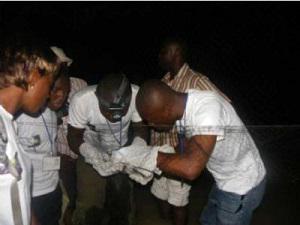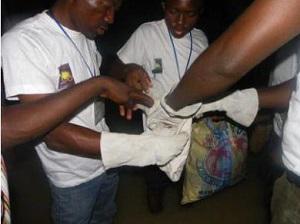Eric Moise Bakwo Fils
Other projects
24 Jul 2008
Contribution to the Knowledge of Fruit Bats of the Southern Cameroon Rainforest: Implication for Seed Dispersal and Forest Conservation
15 Mar 2010
The Role of the Fruit Bat Eidolon Helvum in Seed Dispersal of Azadirachta indica, a Valuable Multipurpose Tree in the Sahelian Region of Northern Cameroon
The overall aim of this project is to create public awareness and participation in the conservation of bat community in north Cameroon.
Considering the importance of bats, there is a good reason to believe that their elimination would certainly have a catastrophic impact on tropical ecosystem. Bats are animals that rarely manage to get onto the agenda by policy makers, yet there is a real need for a policy environment that recognizes their fundamental role in seed dispersal, pollination and pest insect’s control. In north Cameroon, bats facing a high risk of extinction due to hunting, persecution and habitat destruction. The protection of these animals will contribute to preserve their ecological and economical integral roles.

Participants learning how to remove bat from net.
The life line to ensuring long term natural resource management in Cameroon depend on the education of Cameroonian people as main part of the process. Indeed, by training about bat conservation, different targeted groups such as primary school pupils, secondary school students and authorities who managed this critical ecosystem, this will contribute for a long lasting conservation of bats in this region. This project is expected to efficiently dispel various social prejudices on bats and positively change the behaviour of students and youths.

Participants learning how to keep bat in bag.
This project will last for 12 months. It will be done in the Far North Region of Cameroon. The project has therefore evolved out of my second RSG implemented in this area.
Implementation of Bat groups in three pilots secondary school in Maroua:
The members of each group will be trained in bats captured techniques (mist nets, high nets, canopies nets, harp trap and echolocation call) and identification. They will serve as a conduit through which other young people can be educated on how to protect and understand the importance of bats. These groups will use education material, mass media information, posters, publicity T- shirt and discussion for informing and educating other young people.
Bat field techniques workshop:
A bat field techniques workshop will be organized at the intention of professional foresters. Indeed, 10 professional’s foresters working in the Waza National park, Benoue National Park and the Regional Delegation of Wildlife and forests will be selected to participate. This workshop will focused on general field techniques and taxonomy with an attention on the IUCN Red List Criteria and Categories.
The objectives of this workshop are:
1/ convey practical field techniques for use for ecological studies,
2/ reinforce and improve handling, field and lab techniques for scientific studies.
During 6 days, we will have a lecture session every morning followed by a demonstration in the field in the afternoon, and bat watching and catching at night.
School presentations in ten primary schools in Maroua:
We will make presentation in these schools using live animals (insectivorus and frugivorus) to demonstrate to the pupils the species diversity, size , colour and diet of these species. We will develop education teaching materials (books, posters, and video) that provide visuals explanation of bat’s diversity and importance